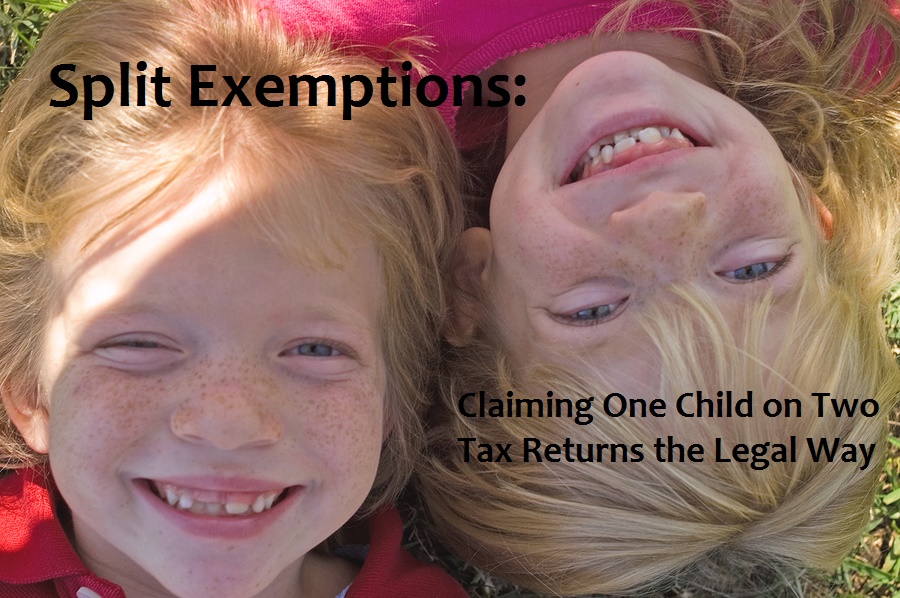
Splitting an exemption is not illegal if you follow the proper rules. Learn how here.
Sometimes when I’m working with a divorced couple, it seems that the most beneficial way to prepare the tax return is to split the exemption for their child. When I say that, they always tell me, “But I heard that was against the law!” No—that’s not exactly true. But let me tell you, there is a right way and a wrong way to do it. If you follow the rules and do it correctly, it’s not only legal, it’s the right thing to do. Warning: if you don’t follow the rules, you could be breaking the law. I give a lot of advice to do-it-yourselfers, but if you’re planning to split an exemption, I recommend you go to a professional for it. (And if she tells you it can’t be done—hire somebody who knows what she’s talking about.)
With most divorced couples (I’m including here couples who were never married but have split apart and have lived apart for at least 6 months of the past tax year), one parent (usually the mother) has custody and the other parent (usually the father) has visitation rights. A lot of couples say that they have “joint” custody – for example, the kids stay with the dad every Wednesday night and every other weekend and with the mom the rest of the time. If you count the days, under IRS rules, the mother wins on the custody status. According to the IRS, wherever the child spends the most nights is where the child lives—if you’ve got one of those every other weekend and every Wednesday night agreements, the IRS doesn’t count that as being equal.
In my example, I’m saying the child lives with the mother. In IRS lingo, the mother in this example is the “custodial” parent and the father is the “non-custodial” parent.
In this case, the mom has all the power—she’s the custodial parent. The mom can claim all the benefits of having a child on the tax return. Those benefits include:
- Head of Household filing status-a lower tax rate
- Childcare tax credit-credit for money you spend on daycare
- Childcare exclusion-so you don’t get taxed if your company pays for daycare
- Earned Income Credit-this can be worth up to $3,094 for one child
- Exemption for the child-a deduction of $3,600 off your income
- Child Tax Credit-worth up to $1,000
When tax professionals tell you that you can’t split exemptions, what they’re reading is the section of Pub. 17 (that’s like our Bible for tax stuff) that says these things always go to the same person. What they’re not reading is page 31—the part that tells you about the special rules for divorced or separated parents. Under the special rules section, it says that the mom (our custodial parent) can release the exemption for the child to the father (the non-custodial parent). This lets him claim the exemption and the child tax credit on his return, while the mom keeps the head of household status, the dependent care credit, and the EIC on her return.
Why would anyone want to do this? Lots of reasons! Number one, of course, is to maximize the amount of money you get back from the government. A lot of times, after a divorce, the mom doesn’t have a very high taxable income. Remember, child support isn’t taxable. The dad has lost a lot of his deductions so his tax bill could be pretty high. He’d probably never qualify for an earned income credit anyway, but the $1000 child tax credit would really help him out. If the mom’s taxable income is really low, she wouldn’t even qualify for the $1000 child tax credit. In some cases she could give it away without it hurting her at all. Or maybe the father is behind on child support, she could negotiate: if he catches up on the child support by December 31st, she’ll sign the form to allow the father to claim the child’s exemption. Remember, when claiming the exemption for a child, the custodial parent has all the power. If the dad claims the child without permission, the mom can just file her own return fully claiming the child and sending the dad’s return to the IRS audit division. You don’t want that to happen.
Splitting an exemption isn’t the best choice for everybody. You have to look at both returns and see if it’s going to work. It also helps to be on good terms with the ex—this certainly doesn’t work well with people who are fighting.
There are a lot of other rules that I haven’t even touched. (That Pub. 17 book is 295 pages long!) But if you are divorced or separated, you need to know that splitting an exemption might be an option for you to use on your income tax return.
_____________________________________________________________________________________
Here are some links that might help:
EIC questions of any kind: EITC Assistant
How to find free tax preparers: Free Tax Help
How to find your local IRS office: Find an IRS Office
